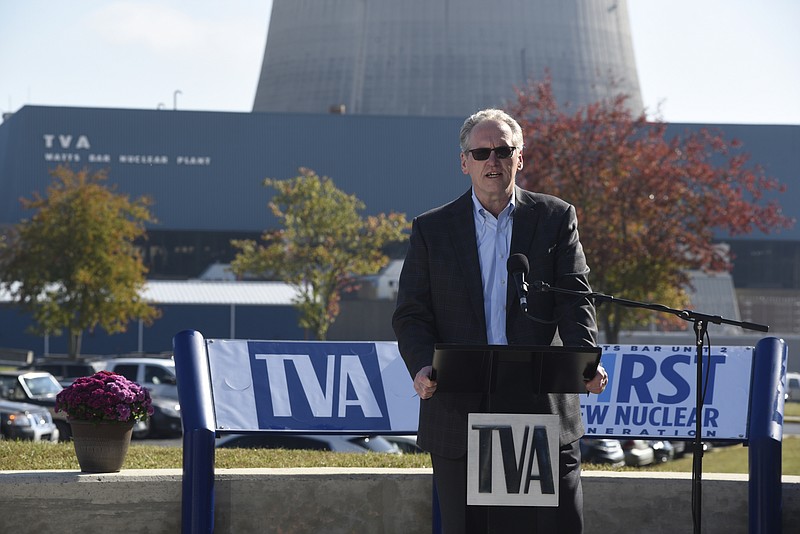For the first time in its 83-year history, the Tennessee Valley Authority is delivering less electricity to the average household than in years past.
Electric power usage is falling as most households and businesses switch to more energy efficient lights, appliances and motors.
"We are seeing something that we have not seen before, which is a decline in per capita usage - mostly due to organic efficiencies," TVA President Bill Johnson said Tuesday in announcing a drop in TVA sales during the first half of the current fiscal year.
As TVA gears up for its traditionally heavy summertime power demand for air conditioning during the hot summer months, the utility does not expect to approach the summertime peak reached in 2007 when TVA customers consumed 33,499 megawatts of electricity.
"We don't know if we are going to ever see that 2007 peak again or not," Johnson said. "We have a record number of customers we serve today, but on a per capita basis, usage is declining."
A decade ago, TVA forecast load growth of nearly 4 percent a year, requiring TVA to add an extra coal or natural gas unit every year or another nuclear reactor every two or three years. But power demand ended up falling during the 2008-2010 recession and has not fully bounced back yet.
In TVA's most recent Integrated Resource Plan largely written two years ago, TVA predicted annual growth of nearly 1 percent and once again those projects have been lowered.
The slowdown in power demand growth has come even as economic growth has quickened in the Tennessee Valley. TVA said it helped recruit more than $6 billion of new investment in the Tennessee Valley during the past six months.
"It's a brave new world and we've decoupled the long-time link between economic growth and increasing demand for power," said Stephen Smith, executive director for the Southern Alliance for Clean Energy in Knoxville and an advisor for both of TVA's last two long-range power plans. "We no longer have to invest so much in power generating facilities that pollute our atmosphere or contribute to global warming and we see that as a good thing."
The slowdown in demand is leading the TVA board to vote this week to declare its unfinished Bellefonte Nuclear Power Plant in Alabama as surplus and no longer needed.
TVA power sales in the first half of the current year fell by 8 percent from last year, due primarily to milder winter weather this year compared with the frigid polar vortex of the year before. But adjusted for weather conditions, TVA's demand was up less than 0.2 percent in the past year and TVA expects only 0.1 percent to 0.2 percent weather- adjusted growth for the foreseeable future.
"We're seeing essentially flat growth," TVA Chief Financial Officer John Thomas said.
In its quarterly financial report released Tuesday, TVA reported it earned $281 million for the first six months of the fiscal year ending March 31, on sales of nearly $4.78 billion. A year ago, TVA reported net income of $577 million on sales of $5.2 billion.
"The real story here is we've been able to maintain a healthy financial picture despite lower revenues," Johnson said. "The cost efficiencies we've achieved in the past few years, combined with our diversified power fleet, are keeping power prices lower for customers, even with lower sales."
Over the past three years, TVA has trimmed $600 million in annual operating expenses by cutting more than 2,000 staff and contractor jobs, closing some of its oldest coal units and streamlining other operations. TVA said its operating expenses for the past six months were 2 percent lower than the previous year.
TVA reduced its fuel and purchased power expenses and lowered its interest expenses, cutting its average cost of delivered power by more than 3 percent from 6.6 cents per kilowatthour in 2015 to 6.4 cents per kilowatthour this year.
The drop in TVA demand is lowering the utility's need to build more capacity, although TVA still spent a record $3.6 billion last year on capital improvements to finish its Watts Bar Unit 2, to start work on new natural gas-fired plants in Memphis and Paradise, Ky., and to install coal scrubbers at its Gallatin Fossil Plant near Nashville.
Thomas said TVA's average borrowing cost for such projects is now at 4.88 percent - one of the lowest rates in TVA history.
"Overall, we still have a debt reduction plan, but we expect to be in the market next year when we have $1.7 billion of debt that is maturing at an average rate of 5.25 percent," Thomas said. "We would expect to have a blended rate that continues to come down."
Contact Dave Flessner at dflessner@timesfreepress.com or at 423-757-6340.
